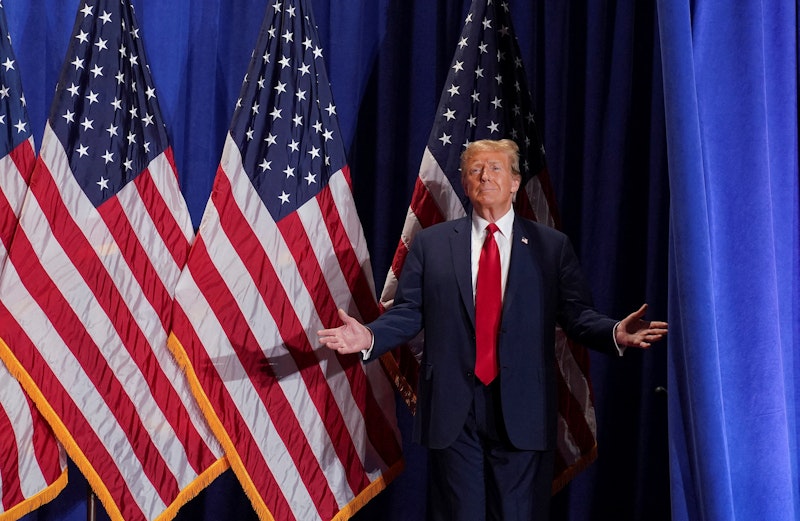“Since the First World War Americans have been leading a double life,” Norman Mailer wrote in Esquire in 1960, “and our history has moved on two rivers, one visible, the other underground; there has been the history of politics which is concrete, factual, practical, and unbelievably dull if not for the consequences of the actions of some of these men; and there is a subterranean river of untapped, ferocious, lonely and romantic desires, that concentration of ecstasy and violence which is the dream life of the nation.”
Mailer’s essay, “Superman Comes to the Supermarket,” remains extraordinary. In “Superman” Mailer was both a political reporter and the Jungian analyst of the nation. He was dealing not just in facts but in cosmic ideas and archetypes. In doing so he uncovered something that had been part of our politics for decades. Mailer contends that however much technology, manners or politics tries to eradicate the dynamic, sexy, dangerous and mythic American hero, he’ll still appear and Americans will still embrace him. This figure represents, even in part, the “dream life of the nation referenced above.” He’s not a savior, and can be a dangerous man. Yet Americans who love freedom, danger, and self-made men, will be attracted to the “Superman.”
The Superman can come from politics, movies, sports or the arts. He’s not a technocrat or woke. “The twentieth century may yet be seen as that era when civilized man and underprivileged man were melted together into mass man,” Mailer writes, “the iron and steel of the nineteenth century giving way to electronic circuits which communicated their messages into men, the unmistakable tendency of the new century seeming to be the creation of men as interchangeable as commodities, their extremes of personality singed out of existence by the psychic fields of force the communicators would impose.”
Mailer is predicting the digital monoculture—our woke 2024 where any infractions against the liberal priesthood results in excommunication. Despite this, as Mailer notes, “America was also the country in which the dynamic myth of the Renaissance—that every man was potentially extraordinary—knew its most passionate persistence. Simply, America was the land where people still believed in heroes: George Washington; Billy the Kid; Lincoln, Jefferson; Mark Twain; Jack London; Hemingway; Joe Louis; Dempsey; Gentleman Jim; America believed in athletes, rum-runners, aviators; even lovers, by the time Valentino died.“
John F. Kennedy was such a figure—a politician, but also a war hero and a man with a genuine aura of grace, sexiness and danger. He’s the “Superman who comes to the supermarket,” a dashing and epic figure who met with shoppers while he was campaigning. Kennedy’s connection to sex, violence, art and “the dream life of the nation” made him powerful, mythic. It was archetypal, deeper than mere politics.
Over the decades such a figure has continuously reemerged in American culture and politics—much to the dismay of those who would keep him down. Two from the world of politics since Kennedy are Ronald Reagan and Barack Obama. Reagan, renounced as a psychopath by the left, came from the West and movies—two archetypical places. Mailer argued that when the West was settled “the expansion turned inward, became part of an agitated, overexcited, superheated dream life. The film studios threw up their searchlights as the frontier was finally sealed, and the romantic possibilities of the old conquest of land turned into a vertical myth, trapped within the skull, of a new kind of heroic life, each choosing his own archetype of a neo-renaissance man, be it Barrymore, Cagney, Flynn, Bogart, Brando or Sinatra, but it was almost as if there were no peace unless one could fight well, kill well (if always with honor), love well and love many, be cool, be daring, be dashing, be wild, be wily, be resourceful, be a brave gun.”
Then there was Obama. As a black man Obama was conversant in the dream world of the nation—the place of jazz and soul and Ralph Ellison. There was no way that Hillary Clinton, a dry and calculated politico, could compete with that. It’s important to emphasize that Mailer’s Superman isn’t a messiah. He doesn’t promise salvation. Reagan told us the government could not save us. Kennedy openly acknowledged that “we are all mortal.” Obama was treated like Jesus by the left, something he played off of but knew was a scam.
What about Trump? Trump comes from the worlds of New York business and Hollywood. He’s perceived by many Americans as a glamorous success story. That’s probably why all attempts by the left to shut him down have failed. Trump doesn’t have Kennedy’s sexiness or Obama’s soul. What he does possess is what other Supermen have—the unstoppable will to live freely despite what the mob thinks. For this he remains impossible to euthanize.
Over six decades ago, Mailer saw this: “This myth, that each of us was born to be free, to wander, to have adventure and to grow on the waves of the violent, the perfumed, and the unexpected, had a force which could not be tamed no matter how the nation's regulators—politicians, medicos, policemen, professors, priests, rabbis, ministers, idèologues, psychoanalysts, builders, executives and endless communicators—would brick-in the modern life with hygiene upon sanity, and middle-brow homily over platitude; the myth would not die.”

